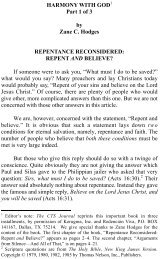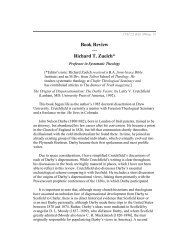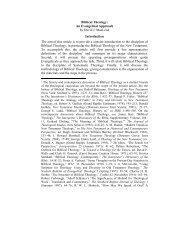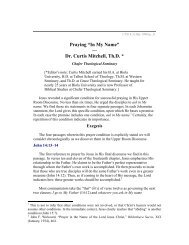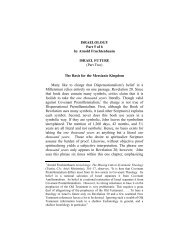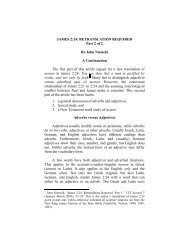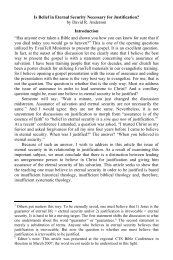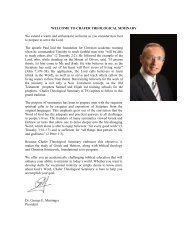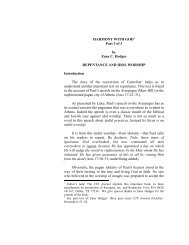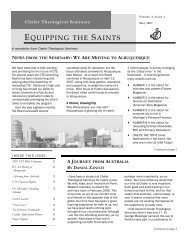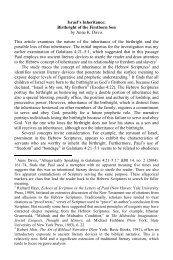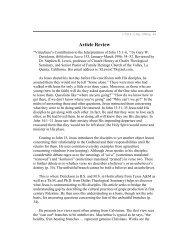ABIDING IN CHRIST - Chafer Theological Seminary
ABIDING IN CHRIST - Chafer Theological Seminary
ABIDING IN CHRIST - Chafer Theological Seminary
You also want an ePaper? Increase the reach of your titles
YUMPU automatically turns print PDFs into web optimized ePapers that Google loves.
Abiding in Christ 23<br />
with the Holy Spirit. 26 This does not involve some mystical<br />
takeover of the believer’s volition, or “letting go and letting God.”<br />
That indeed would be the result, if Paul used a genitive of content<br />
in Ephesians 5:18. However, the instrumental dative emphasizes<br />
the Holy Spirit as the ultimate means of sanctification. The idea is<br />
not control, but influence. The Spirit does not operate in a<br />
vacuum, but always in conjunction with the Word of God, the light<br />
of divine revelation. Neither works apart from the other.<br />
Emphasis on the Holy Spirit without equal emphasis on learning<br />
and applying the principles of revelation would inevitably lead the<br />
believer to a subjective mystical approach. In contrast, emphasis<br />
on study apart from the indispensable role of the Holy Spirit leads<br />
to knowledge for knowledge’s sake, a merely academic emphasis<br />
confusing human morality with spiritual growth produced by the<br />
Holy Spirit.<br />
Conclusion<br />
This second article has built on the conclusions of the first.<br />
In the first we established from John 15 that three types of<br />
Christians exist: 1) those abiding in Christ who are young and have<br />
not yet produced fruit, 2) those abiding in Christ and in whom fruit<br />
is produced, and 3) those who do not abide in Christ and are<br />
removed in divine discipline. We demonstrated that abiding is<br />
synonymous with fellowship. In broad terms, there are only two<br />
categories of Christians, those who abide and those who do not.<br />
Paul describes the latter as carnal Christians (1 Corinthians 3:1–3).<br />
Knowingly or not, those who interpret abiding as tantamount<br />
to believing, erect their position on a view using the vine analogy<br />
for Israel in the Old Testament as the hermeneutical grid for<br />
understanding the vine of John fifteen. This view is inconsistent<br />
with a main tenant of dispensationalism. Moreover, this<br />
26 When the believer is out of fellowship, the doctrine learned is only<br />
academically perceived, and, apart from the walk by the Spirit, is not profitable<br />
for spiritual growth. To become profitable for spiritual growth the believer must<br />
first return to a walk by means of the Spirit, which is tantamount to abiding, or<br />
restoration of fellowship.



